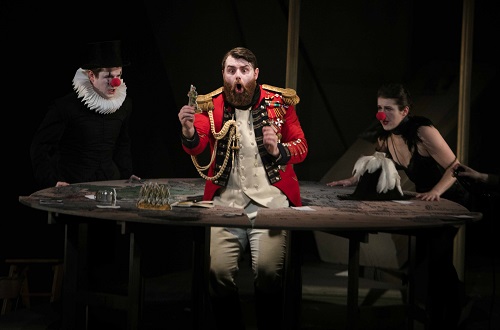 United Kingdom Holst and Ullmann: Orchestra of the Royal Conservatoire of Scotland / Lionel Friend (conductor), Royal Conservatoire of Scotland, Glasgow, 20.1.2018. (SRT)
United Kingdom Holst and Ullmann: Orchestra of the Royal Conservatoire of Scotland / Lionel Friend (conductor), Royal Conservatoire of Scotland, Glasgow, 20.1.2018. (SRT)

Holst – Sāvitri
Ullmann – The Emperor of Atlantis
Cast (Sāvitri):
Sāvitri – Rebecca Godley
Satyavān – Thomas Kinch
Death – Mark Nathan
Cast (The Emperor of Atlantis):
Emperor Uberall – Colin Murray
Loudspeaker – Pedro Omett
Death – Jerome Knox
Harlequin – David Lynn
Soldier – Seumas Begg
Bubikopf – Nina Coleman
Drummer – Joanna Harries
Production:
Director – Caroline Clegg
Assistant Conductor – June-Sung Park
Set & Costume Designer – Louie Whitemore
Lighting Designer – Davy Cunningham
Sound Designer – Jack McWeeny
The Royal Conservatoire of Scotland is Scotland’s academy for the performing arts, and every year the opera students put on a series of performances that showcase their talents. It’s often stuff at the fringes of the repertoire – several years ago I remember them doing Prokofiev’s War and Peace and Betrothal in a Monastery, for example – and this year the Conservatoire’s new head of opera, Philip White, has strikingly chosen a pair of seemingly unconnected chamber operas. In fact, in terms of mood and spirit, it’s hard to imagine two twentieth century works further apart than Holst’s Sāvitri and Ullmann’s Emperor of Atlantis. However, they both feature the figure of Death who, for one or other reason, is frustrated in his duties.
Sāvitri grows out of Holst’s fascination with eastern mysticism, and is drawn from an episode in the Mahabharata. Death comes to claim Satyavān, husband of Sāvitri but, pleased by her greeting, Death grants Sāvitri a wish, as long as it is not the return of Satyavān. Sāvitri asks for life, which Death grants her, but life, she says, is impossible without Satyavān so he is granted a reprieve from death. It’s a delicate score, light years away from the composer’s better known orchestral works, featuring a cast of three singers and only twelve instrumentalists; but that inspires the composer to summon up beautifully delicate textures which manage to evoke both the intimate domesticity of the married couple and the eastern inflections of the story’s origins.
Rebecca Godley was very impressive in the title role, her warm, confident mezzo capable of striking through the textures without every sounding too intrusive, and at her most moving in the poignant passage after Satyavān’s death. As Satyavān himself, Thomas Kinch’s voice had a tendency to spread at the top, but his middle and lower register was very fine. Finer still, however, was the marvellous baritone of Mark Nathan as Death. He sang the part with commanding tone but also an uncommon degree of warmth. This meant that the duets for Sāvitri and Death became the emotional centres of the work. That was true for the remarkable unaccompanied duets that begin and end the piece but also, more importantly, for their extended scene when Sāvitri makes her request of Death. That section was so intimate as to be almost erotic, and at times it left me wondering whether the work is really about the love that Sāvitri bears for Death rather than her husband.

Louie Whitemore’s understated set worked extremely well, with an uncluttered stage that had the right amount of space for the family scene, and some trees that stretched up into the flies. There was also a rather lovely sunset effect to echo the sense of resolution at the opera’s end. It stood in marked contrast to the hyperactive set for The Emperor of Atlantis, an abandoned theatre littered with props and clutter, which served for a mirror of the barmy action. I rather liked the dichotomy, though. Caroline Clegg’s production dressed the characters in identical overalls until they came to inhabit their individual roles, and I liked the central image of the Emperor entrapped by the world map of the territories he has conquered. She also wasn’t afraid to buy into the surrealism at the heart of the work, which is central to the satire of Ullmann’s premise. Written in the Terezín internment camp in 1943, the opera was a thinly veiled satire on Hitler which was ultimately banned by the camp’s guards. Ullmann himself was shortly thereafter transported to Auschwitz and murdered.
The energetic cast of singers really bought into the premise, and the scabrous score gave them plenty of opportunities to shine. The men were especially good, led by a hugely impressive Death from Jerome Knox, whose warm, humane baritone was a beautiful thing to listen to, a neat contrast to the booming and utterly commanding bass of Pedro Ometto. Colin Murray’s hard-edged tone was just right for the paranoid authority figure of the Emperor, while David Lynn used the natural stridency of his voice to great effect as the energetic Harlequin, and the lyrical tenor of Seumas Begg was the most human character in the piece as the Soldier. The pair of ladies were well contrasted too, the sweetness of Nina Coleman’s Bubikopf nicely balancing the melodrama of Joanna Harries’ Drummer.
Old hand Lionel Friend paced and controlled both scores very well, and I very much enjoyed the way the sleazy elements of jazz came out in the energetic playing of his musicians. It’s only a shame that they replaced the female chorus in Sāvitri with the all-too-electronic sound of a synthesiser, though I suppose that was probably a wise stewarding of the resources they had available to them.
This opera double bill runs until Saturday 27 January. It could be your best chance to see either of these works staged. For details go to www.rcs.ac.uk.
Simon Thompson